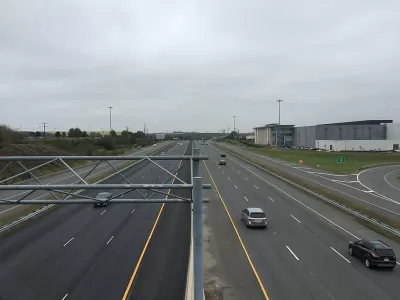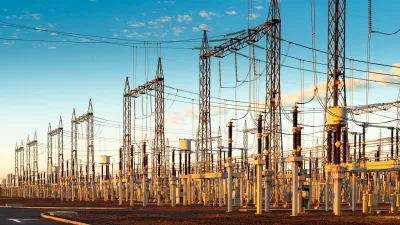While it’s unlikely to expect local and state governments to insist that data center developments locate somewhere else, specific policy steps can ensure a more positive impact for communities.

Ivy Main reports on the proliferation of data centers in Virginia. While the appeal of such developments is well documented, and mostly succeeding in finding space in local land use regulations, there are also, less well documented, drawbacks.
First, Main explains the case for data centers:
Data centers pay a lot of local taxes while requiring little in the way of local services, and the steady buildout has supported thousands of construction jobs across the region. Indeed, so many data center companies have chosen to locate in Northern Virginia that we now host the largest concentration of data centers in the world. No wonder other regions of the commonwealth are angling to bring data centers to their neck of the woods too.
But then there are some of the drawbacks:
To drive through Data Center Alley is to witness suburban sprawl on steroids, with its attendant deforestation, loss of farmland and loss of wildlife habitat. The environmental destruction doesn’t stop at a facility’s property line; a single building covers acres of land, causing massive rainwater runoff problems that can impact streams and drinking water resources miles downstream.
Main also lists water consumption, noise pollution, air pollution, and energy inefficiencies as other problems created by Virginia’s data centers. The headline of the article says the state “has a data center problem.” The lede says it’s actually “several data center problems.”
The article digs into why Virginia has so many data centers, which includes policies set at the regional and state levels. Main also suggests some policy changes to help mitigate some of the negative effects of the state’s data centers.
FULL STORY: Virginia has a data center problem

Alabama: Trump Terminates Settlements for Black Communities Harmed By Raw Sewage
Trump deemed the landmark civil rights agreement “illegal DEI and environmental justice policy.”

Study: Maui’s Plan to Convert Vacation Rentals to Long-Term Housing Could Cause Nearly $1 Billion Economic Loss
The plan would reduce visitor accommodation by 25% resulting in 1,900 jobs lost.

Planetizen Federal Action Tracker
A weekly monitor of how Trump’s orders and actions are impacting planners and planning in America.

Federal Homelessness Agency Places Entire Staff on Leave
The U.S. Interagency Council on Homelessness is the only federal agency dedicated to preventing and ending homelessness.

Restoring Northern India’s Himalayan ‘Water Temples’
Thousands of centuries-old buildings protect the region’s natural springs and serve as community wells and gathering places.

Milwaukee to Double Bike Share Stations
Bublr Bikes, one of the nation’s most successful, will add 500 new e-bikes to its system.
Urban Design for Planners 1: Software Tools
This six-course series explores essential urban design concepts using open source software and equips planners with the tools they need to participate fully in the urban design process.
Planning for Universal Design
Learn the tools for implementing Universal Design in planning regulations.
Caltrans
Smith Gee Studio
Institute for Housing and Urban Development Studies (IHS)
City of Grandview
Harvard GSD Executive Education
Toledo-Lucas County Plan Commissions
Salt Lake City
NYU Wagner Graduate School of Public Service





























